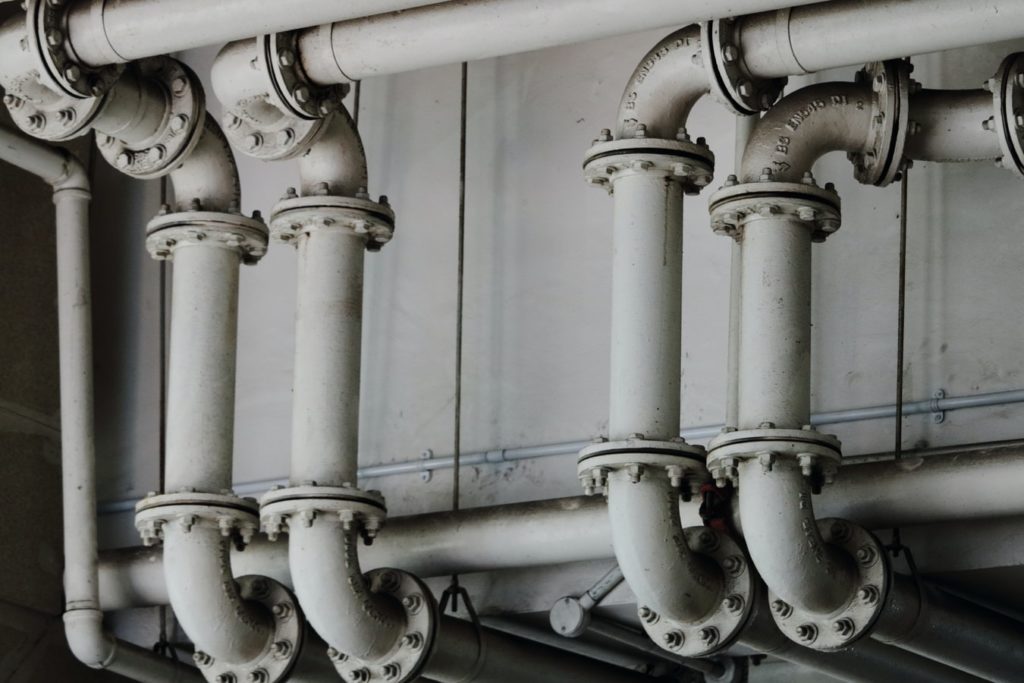Few people spend much time thinking about their plumbing until they need a plumber. Then you can become a hero.

Plumbers install, repair and maintain pipes, fixtures and other plumbing equipment used for delivering water and disposing of waste water in residential, commercial and industrial buildings. A plumber may be self-employed, work for a plumbing company, construction company, or be part of a crew working for a large organization, such as a university’s maintenance department.
You’ll interact with different people every day, solving problems that could become nightmarish if left unchecked. The two fastest ways a building can sustain significant damage is through out-of-control water or fire moving through the structure. We have firefighters for one of those problems. As a plumber, your job is to resolve the other.
On any given day you might be working indoors or outdoors, alone or alongside other construction professionals. The job takes you into private homes and construction sites, where you’ll be installing pipes, fixtures and following the plumbing designs or blueprints for new buildings.
This work can be physically challenging. You’ll need to be able to stand or crouch for long periods of time, as well as contort your body into unusual angles to get under a sink, for example. Lifting heavy materials is also part of the job, as you’ll be called on to install kitchen sinks, toilets, bathtubs and the pipes required to connect them.
Plumbers make good money and demand for these skilled professionals is expected to remain strong indefinitely. When you decide to become a plumber, you are setting yourself up for lifelong job security.
Read on to discover what’s involved in becoming a plumber.
In this article you’ll learn:
- How much money you can make as a plumber
- The required training and certifications
- Professional groups to join
- Employment opportunities for plumbers
- Finding clients
- Plus helpful tips
How much money can you make?
The average wage for plumbers, pipefitters, and steamfitters is $55,160 a year, according to the US Bureau of Labor Statistics. That works out to $28.73 per hour. Employment of plumbers is expected to grow 14 percent through 2028, much faster than the average for all US occupations. Self-employed plumbers typically earn much more, although they are also responsible for providing their own equipment and vehicles, office and storage space, insurance and marketing.
Training and Certification
All states require plumbers to be trained, certified and licensed to perform the work. There are typically two tiers for the profession: journeyman and master plumber.
Here is a comprehensive listing of licensure requirements for plumbers in all 50 US states.
To be certified as a plumber, you usually need to complete an apprenticeship program of 3-4 years. Once you successfully complete the required on-the-job training, technical training and exams, you can apply for a journeyman’s license. As an apprentice, you’ll get to “earn while you learn” with a salary that may start at about half the local rate for a journeyman. Your wages increase as you build experience.
Some states allow a substitution of experience for classroom training. Check with your state to see what regulations apply to plumbers where you live.

To become an apprentice you’ll generally need at least a 10th grade education, although some states require a high school diploma or GED.
Continuing education is also important to stay current with the latest plumbing materials, fixtures, faucets and other components. As plumbing fixtures change and new products come on the market, you’ll need to know any special techniques for their installation and repair.
Skills you’ll learn while training:
- Installing, repairing and maintaining domestic, commercial and industrial plumbing systems
- Measuring and marking positions for pipe connections and fixtures in walls and floors
- Cutting openings in walls and floors to install pipes and pipe fittings
- Measuring, cutting, bending and installing pipes using plumbing tools
- Joining pipes for a watertight seal, using clamps, screws, bolts or cement
- Welding
- Testing for leaks
- Creating cost estimates for installations and repairs
- Reading and understanding blueprints
Once you’ve learned the licensure requirements in your state, you’ll be better prepared to choose the right training program. An extensive list of plumbing schools can be reviewed here.
Professional Groups to Join
Membership in a professional association can help your career in several ways. Associations often provide continuing education opportunities so you can stay on top of evolving techniques and learn how to install and repair the latest kitchen and bathroom fixtures. You’ll be able to network with other plumbers in the association, learn from more experienced professionals, share stories and exchange tips on job openings. Here are several of the most relevant professional groups for plumbers:

American Society of Plumbing Engineers
The American Society of Plumbing Engineers (ASPE) was founded in 1964 as an organization dedicated to the advancement of the plumbing engineering profession, assisting the professional growth of its members, and protecting the health, welfare, and safety of the public.
National Kitchen & Bath Association
The National Kitchen & Bath Association (NKBA) is a non-profit trade group that promotes the professionalism of the kitchen and bath industry. Founded in 1963 as a network of kitchen dealers, it has grown into the premier association of distributors, retailers, remodelers, manufacturers, fabricators, installers, designers, and other professionals. The NKBA’s certification program emphasizes continuing education and career development and includes designers and professionals in all segments of the kitchen and bath industry, including plumbers. You can keep up with the latest remodeling products and styles through this association.
The United Association of Journeymen and Apprentices of the Plumbing and Pipe Fitting Industry of the United States, Canada (UA), represents approximately 340,000 plumbers, pipefitters, sprinkler fitters, service technicians and welders in local unions across North America. They also honor a federation agreement with both the Australian Plumbing Trades Employees Union (PTEU) and Irish Technical, Engineering Electrical Union (TEEU).
The Water Quality Association (WQA) is a not-for-profit group for the residential commercial, and industrial water treatment industry. WQA represents more than 2,700 member companies around the globe. Membership consists of equipment manufacturers, suppliers, dealers and distributors of water quality improvement products and services. WQA educates water treatment professionals, certifies water treatment products, acts as a resource for public information and is the voice of the water quality improvement industry.
Employment
When you’re just starting out as a plumber, you may not be ready to start your own business. The up-front costs can be significant. First, you’ll need specialized tools and a vehicle to transport them. Office and storage space may need to be leased. Then there’s business insurance, liability insurance. You may want to get tool insurance, too, for coverage in the event of lost or stolen tools. These items add up quickly.

While you’re building your savings to start your own plumbing business, if that is your dream, you can find work with plumbing companies in your area as well as construction companies and the maintenance departments of large organizations. Colleges and universities, for instance, will often have a team of plumbers and other maintenance professionals working in-house due to the sheer size of their facilities.
Don’t forget to search online sites such as Indeed and ZipRecruiter to find local jobs. Send or hand-deliver your resume, copies of your certifications and license, plus references to companies hiring plumbers in your area. Consider taking some “before” and “after” photos of installation projects to show off your craftsmanship. An expert bathroom remodel looks impressive to prospective employers. Always follow up with a phone call after mailing or dropping off your materials.
Finding Clients
Congratulations. You’re launching your own plumbing business. Here are 7 solid tips for ramping up your marketing – fast – so you can concentrate on making money with your services.

Claim your Google Business listing
When you set up a free Google Business profile you create an online calling card that works on your behalf 24 hours a day, 7 days a week. Your business profile lists the name of your company, the services you offer, hours of operation, your phone number, a link to your company website and a Google map that shows the location of your business. Below that information is a space for customers to review your company. This is an opportunity to boost your word-of-mouth advertising. Always ask satisfied customers to leave a positive review on your Google Business page. The page is also automatically optimized to show up in search results. So when a customer goes online to find a plumber, the companies with the best reviews tend to float to the top of the search results.
Create a website
List all your services and complete contact information. Don’t put your prices on the website, as that’s a topic best discussed directly with the customer once you know the scope of a project or repair. From time to time, you can add an article to the website about some aspect of plumbing that consumers would find useful. You can write these articles yourself or hire a freelance writer to prepare this content.

When building the website, whether you do it yourself or hire someone, be sure to include a simple contact form that people can fill out. This feature is sometimes called a work request and it’s for customers who are still in the researching/shopping around phase. They’re thinking about a bathroom remodel, maybe upgrading the kitchen. A work request form lets customers share what they have in mind so you can provide a thoughtful response. This works better than using email, because messages can get lost or shuffled into a spam folder. Customer requests for information entered on your website are delivered directly to you. No fish slip through the net.
Set up a Facebook page
You’ve got to go where the potential customers are hanging out, and that means building a social media presence. Similar to a Google Business listing, your Facebook page contains all your basic contact information. You can post helpful tips, maintenance specials and anything else relevant to your plumbing business. And it’s free.
Good to know:
At some point, virtually all small business owners will consider whether to pursue paid advertising and, if so, where and how much. In the plumbing business you typically encounter two kinds of customers. One is shopping around for a professional to help with a remodeling project. The other has a clogged toilet or a burst pipe that’s spraying everywhere, in other words, an emergency.
Your website with its work request form has you covered for the first category of customer.
The second category of customers want to get a pro on the phone right now, double-quick.
For them, consider marketing services that provide call-only ad campaigns. Here’s how it works: in an emergency situation, most consumers are probably going to grab their smartphones and start searching for a plumber. Your call-only campaign displays your ad on the customer’s phone. One tap dials your number. Here is one example of a call-only ad service. Costs are based on pay-per-click, so unless someone clicks your ad to initiate a phone call, you pay nothing. This is as close to a sure-fire method for capturing your share of urgent-service customers that’s currently available.
If you enjoyed this article, check out some more great PocketSuite.io content that can help you grow your career as a plumber. Here’s a great place to start.PocketSuite has thousands of business owners who all started where you are right now. Our community is always happy to help you ramp up, grow your client base, and achieve your income goals, both within the PocketSuite app and as part of our exclusive Facebook Community Group. PocketSuite’s vision is for any professional to be able to work for themselves and make a great living. It starts here. It starts with you. It starts today. Let’s get started, download PocketSuite now! Feel free to reach out with any questions (we’d love to hear from you)! Text us @ (415) 841-2300.





